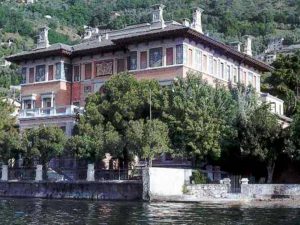Are locally finite MV-algebras a variety?
Here you can find the slides of my talk Are locally finite MV-algebras a variety? presented at the Shanks Workshop on Ordered Algebras and Logic at Vanderbilt University (Nashville, US) and on Zoom for the Algebra|Coalgebra seminar of the ILLC (Amsterdam).
The material is based on a joint work with M. Abbadini (University of Salerno).
Corso di “Algebra della Logica” alla scuola AILA 2017
 This year I teach a course (12 hours) a the AILA summer school of logic. Below one can find the slides of my first three lectures and some references.
This year I teach a course (12 hours) a the AILA summer school of logic. Below one can find the slides of my first three lectures and some references.
- Lecture 1 (Classical propositional logic and Boolean algebras)
- Lecture 2 (Algebraic completeness of propositional calculus)
- Lecture 3 (Abstract Algebraic Logic)
- Lecture 4 (Dualities) lecture material:
- Lecture 5 and 6 (Non classical logic) references:
- Y. Venema, Algebras and Coalgebras, in: J. van Benthem, P. Blackburn and F. Wolter (editors), Handbook of Modal Logic, 2006, pp 331-426.
- R. L. O. Cignoli, I. M. L. D’Ottaviano e D. Mundici, Algebraic Foundations of Many-Valued Reasoning, Trends in Logic, Vol. 7 Springer, 2000.
Lecture notes by Guido Gherardi (Computability Theory).
A(nother) duality for the whole variety of MV-algebras
This is the abstract of a talk I gave in Florence at Beyond 2014.
Given a category C one can form its ind-completion by taking all formal directed colimits of objects in C. The “correct” arrows to consider are then families of some special equivalence classes of arrows in C (Johnstone 1986, V.1.2, pag. 225). The pro-completion is formed dually by taking all formal directed limits. For general reasons, the ind-completion of a category C is dually equivalent to the pro-completion of the dual category C^{\rm op}.
$$\textrm{ind}\mbox{-}C\simeq (\textrm{pro}\mbox{-}(C^{\rm{op}}))^{\rm{op}}. \qquad\qquad (1)$$
Ind- and pro- completions are very useful objects (as they are closed under directed (co)limits) but cumbersome to use, because of the involved definitions of arrows between objects. We prove that if C is an algebraic category, then the situation considerably simplifies.
If V is any variety of algebras, one can think of any algebra A in V as colimit of finitely presented algebras as follows.
Consider a presentation of A i.e., a cardinal \mu and a congruence [/latex]\theta[/latex] on the free \mu-generated algebra \mathcal{F}(\mu) such that A\cong \mathcal{F}(\mu)/\theta. Now, consider the set F(\theta) of all finitely generated congruences contained in \theta, this gives a directed diagram in which the objects are the finitely presented algebras of the form \mathcal{F}(n)/\theta_{i} where \theta_{i}\in F(\theta) and X_{1},...,X_{n} are the free generators occurring in \theta_{i}. It is straightforward to see that this diagram is directed, for if \mathcal{F}(m)/\theta_{1} and \mathcal{F}(n)/\theta_{2} are in the diagram, then both map into \mathcal{F}(m+n)/\langle\theta_{1}\uplus\theta_{2}\rangle, where \langle\theta_{1}\uplus\theta_{2}\rangle is the congruence generated by the disjoint union of \theta_{1} and \theta_{2}. Now, the colimit of such a diagram is exactly A.
Denoting by V_{\textrm{fp}} the full subcategory of V of finitely presented objects, the above reasoning entails
$$V\simeq\textrm{ind}\mbox{-}V_{\textrm{fp}}. \qquad\qquad (2)$$
We apply our result to the special case where V is the class of MV-algebras. One can then combine the duality between finitely presented MV-algebras and the category P_{\mathbb{Z}} of rational polyhedra with \mathbb{Z}-maps (see here), with (1) and (2) to obtain,
$$MV\simeq\textrm{ind}\mbox{-}MV_{\textrm{fp}}\simeq \textrm{pro}\mbox{-}(P_{\mathbb{Z}})^{\rm{op}}. \qquad\qquad (3)$$
This gives a categorical duality for the whole class of MV-algebras whose geometric content may be more transparent than other dualities in literature. In increasing order of complexity one has that any MV-algebra:
- is dual to a polyhedron (Finitely presented case);
- is dual to an intersection of polyhedra (Semisimple case);
- is dual to a countable nested sequence of polyhedra (Finitely generated case);
- is dual to the directed limit of a family of polyhedra. (General case).
Here are the slides of this talk
Two isomorphism criteria
These are the slides of a presentation given in Stellenbosch on two isomorphisms criteria for co-limits of sequences of finitely presented or finitely generated objects in a locally small categories. The preprint containing full proofs and applications of these two results is available here.
Algebra|Coalgebra seminar
Starting from October 2013 I am organising the Algebra|Coalgebra seminar at the ILLC. The webpage of the seminar are here. See you there!